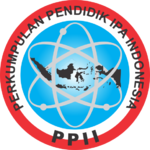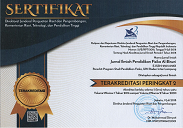STEM education through PhET simulations: An effort to enhance students’ critical thinking skills
Abstract
Keywords
Full Text:
PDFReferences
Agustina, F. R. (2021). Development of STEM Model Student Worksheets with PhET Simulation on Hooke’s Law Material to Improve the Ability Students’ Critical Thinking. Journal of Physics: Conference Series, 2110(1), 12023.
Alatas, F., & Yakin, N. A. (2021). The Effect of Science, Technology, Engineering, and Mathematics (STEM) Learning on Students’ Problem-Solving Skill. JIPF (Jurnal Ilmu Pendidikan Fisika), 6(1), 1. https://doi.org/10.26737/jipf.v6i1.1829
Alea, L. A., Fabrea, M. F., Roldan, R. D. A., & Farooqi, A. Z. (2020). Teachers’ Covid-19 awareness, distance learning education experiences, and perceptions towards institutional readiness and challenges. International Journal of Learning, Teaching and Educational Research, 19(6), 127–144.
Bancong, H., & Putra, D. P. (2015). Analisis proses keterampilan proses sains mahasiswa berdasarkan gaya berpikir dan kecerdasan jamak pada praktikum fisika modern di Universitas Muhammadiyah Makassar. Jurnal Pendidikan Fisika, 3(1), 27–33.
Bancong, H., & Song, J. (2020). Exploring how students construct collaborative thought experiments during physics problem-solving activities. Science and Education, 29(3), 617–645. https://doi.org/10.1007/s11191-020-00129-3
Basri, H., Purwanto, As’ari, A. R., & Sisworo. (2019). Investigating critical thinking skills of junior high school in solving a mathematical problem. International Journal of Instruction, 12(3), 745–758. https://doi.org/10.29333/iji.2019.12345a
Bustami, Y., Syafruddin, D., & Afriani, R. (2018). The implementation of contextual learning to enhance biology students’ critical thinking skills. Jurnal Pendidikan IPA Indonesia, 7(4), 451–457. https://doi.org/10.15294/jpii.v7i4.11721
Changwong, K., Sukkamart, A., & Sisan, B. (2018). Critical thinking skill development: Analysis of a new learning management model for Thai high schools. Journal of International Studies, 11(2), 37–48. https://doi.org/10.14254/2071-8330.2018/11-2/3
Chen, S., CHANG, W., LAI, C., & TSAI, C. (2014). A comparison of students’ approaches to inquiry, conceptual learning, and attitudes in simulation‐based and microcomputer‐based laboratories. Science Education, 98(5), 905–935.
Dekker, T. J. (2020). Teaching critical thinking through engagement with multiplicity. Thinking Skills and Creativity, 37(May), 100701. https://doi.org/10.1016/j.tsc.2020.100701
Duncan, R. G., Chinn, C. A., & Barzilai, S. (2018). Grasp of evidence: Problematizing and expanding the next generation science standards’ conceptualization of evidence. Journal of Research in Science Teaching, 55(7), 907–937. https://doi.org/10.1002/tea.21468
Hand, B., Shelley, M. C., Laugerman, M., Fostvedt, L., & Therrien, W. (2018). Improving critical thinking growth for disadvantaged groups within elementary school science: A randomized controlled trial using the Science Writing Heuristic approach. Science Education, 102(4), 693–710. https://doi.org/10.1002/sce.21341
Jatmika, S., Lestari, S., Rahmatullah, R., Pujianto, P., & Dwandaru, W. S. B. (2020). Integrasi project based learning dalam science technology engineering and mathematics untuk meningkatkan keterampilan proses sains dalam pembelajaran fisika. Jurnal Pendidikan Fisika Dan Keilmuan (JPFK), 6(2), 107. https://doi.org/10.25273/jpfk.v6i2.8688
Kennedy, T. J., & Odell, M. R. L. (2014). Engaging Students In STEM Education. Science Education International, 25(3), 246–258.
Khatri, R., Henderson, C., Cole, R., Froyd, J. E., Friedrichsen, D., & Stanford, C. (2017). Characteristics of well-propagated teaching innovations in undergraduate STEM. International Journal of STEM Education, 4(1). https://doi.org/10.1186/s40594-017-0056-5
Labibah, U. N., Mundilarto, M., & Sulaiman, S. B. (2021). Improvement of Critical Thinking Ability and Preparedness Assisted by Android-Based Media to Understand Landslide through Physics Learning. Jurnal Ilmiah Pendidikan Fisika Al-Biruni, 10(1), 103–111. https://doi.org/10.24042/jipfalbiruni.v10i1.8221
Lee, Y. H. (2018). Scripting to enhance university students’ critical thinking in flipped learning: implications of the delayed effect on science reading literacy. Interactive Learning Environments, 26(5), 569–582. https://doi.org/10.1080/10494820.2017.1372483
Linh, N. Q., Duc, N. M., & Yuenyong, C. (2019). Developing critical thinking of students through STEM educational orientation program in Vietnam. Journal of Physics: Conference Series, 1340(1). https://doi.org/10.1088/1742-6596/1340/1/012025
Mahanal, S., Zubaidah, S., Sumiati, I. D., Sari, T. M., & Ismirawati, N. (2019). RICOSRE: A learning model to develop critical thinking skills for students with different academic abilities. International Journal of Instruction, 12(2), 417–434. https://doi.org/10.29333/iji.2019.12227a
Matsuura, T., & Nakamura, D. (2021). Trends in STEM/STEAM Education and Students’ Perceptions in Japan. Asia-Pacific Science Education, 7(1), 7–33. https://doi.org/10.1163/23641177-bja10022
Özkan, Y. Ö., & Özaslan, N. (2018). Student Achievement in Turkey, According to Question Types Used in PISA 2003-2012 Mathematic Literacy Tests. International Journal of Evaluation and Research in Education, 7(1), 57–64.
Padmanabha, P. (2018). Critical thinking: Conceptual framework. i-manager's Journal on Educational Psychology, 11(4), 45–53.
Papadouris, N., & Constantinou, C. P. (2009). A methodology for integrating computer‐based learning tools in science curricula. Journal of Curriculum Studies, 41(4), 521–538.
Perkins, K. (2020). Transforming STEM Learning at Scale: PhET Interactive Simulations. Childhood Education, 96(4), 42–49. https://doi.org/10.1080/00094056.2020.1796451
Permana, H., Bakri, F., Salsabila, I. H., Ambarwulan, D., Muliyati, D., & Sumardani, D. (2021). The Development of Augmented Reality Application to Explore Fluid Concepts. Jurnal Penelitian & Pengembangan Pendidikan Fisika, 7(1), 53–60. https://doi.org/10.21009/1.07106
Pradana, S. D. S., Parno, P., & Handayanto, S. K. (2017). Pengembangan tes kemampuan berpikir kritis pada materi Optik Geometri untuk mahasiswa Fisika. Jurnal Penelitian Dan Evaluasi Pendidikan, 21(1), 51–64.
Putranta, H., Jumadi, & Wilujeng, I. (2019). Physics learning by PhET simulation-assisted using problem-based learning (PBL) model to improve students’ critical thinking skills in work and energy chapters in MAN 3 Sleman. Asia-Pacific Forum on Science Learning and Teaching, 20(1), 1–45.
Safarati, N., & Lubis, R. H. (2022). Students’ Conceptual Understanding and Critical Thinking Skills Through Online Learning Using a Virtual Laboratory. JIPF (Jurnal Ilmu Pendidikan …, 7(1), 42–49. https://journal.stkipsingkawang.ac.id/index.php/JIPF/article/view/2221
Suyanto, E., Wijaya, K., Maulina, H., & Andra, D. (2021). How To Stimulate Student’s Critical Thinking Skill On Learning Electrical Conversion Energy? Jurnal Ilmiah Pendidikan Fisika Al-Biruni, 10(1), 113–120. https://doi.org/10.24042/jipfalbiruni.v10i1.7197
Syawaludin, A., Gunarhadi, & Rintayati, P. (2019). Development of augmented reality-based interactive multimedia to improve critical thinking skills in science learning. International Journal of Instruction, 12(4), 331–344. https://doi.org/10.29333/iji.2019.12421a
Taibu, R., Mataka, L., & Shekoyan, V. (2021). Using PhET simulations to improve the scientific skills and attitudes of community college students. International Journal of Education in Mathematics, Science, and Technology (IJEMST), 9(3), 353-370. https://doi.org/10.46328/ijemst.1214
Tanti, T., Darmaji, D., Astalini, A., Kurniawan, D. A., & Kartina, L. (2021). Critical Thinking Analysis of 13-14 Years Old Students on Lens Refraction Material. Jurnal Ilmiah Pendidikan Fisika Al-Biruni, 10(1), 149–157. https://doi.org/10.24042/jipfalbiruni.v10i1.7119
Wilujeng, I., & Hidayatullah, Z. (2021). Alternative learning model in physics learning: Effect of the conceptual change model with cognitive conflict on critical thinking skill. Momentum: Physics Education Journal, 5(2), 111–120. https://doi.org/10.21067/mpej.v5i2.5260
Yulkifli, Y., Yohandri, Y., & Azis, H. (2022). Development of physics e-module based on integrated project-based learning model with Ethno-STEM approach on smartphones for senior high school students. Momentum: Physics Education Journal, 6(1), 93–103.
Yusuf, I., & Widyaningsih, S. W. (2019). HOTS profile of physical education students in STEM-based classes using PhET media. Journal of Physics: Conference Series, 1157(3). https://doi.org/10.1088/1742-6596/1157/3/032021
DOI: http://dx.doi.org/10.24042/jipfalbiruni.v11i1.10998
Refbacks
- There are currently no refbacks.

Jurnal ilmiah pendidikan fisika Al-Biruni is licensed under a Creative Commons Attribution-ShareAlike 4.0 International License.
![]()







